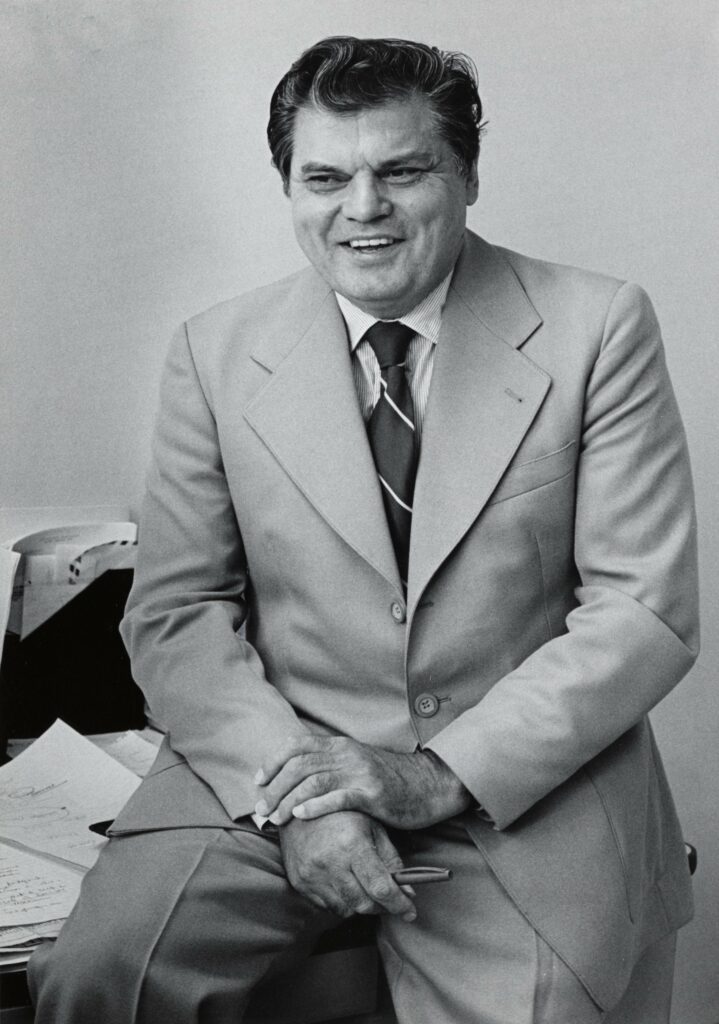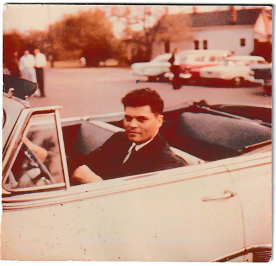
Ray Anderson, Professor Emeritus and former foreign correspondent for the New York Times, died on September 24, 2023 in Middleton, Wisconsin. He was 96.
During his 15-year career as a professor in the University of Wisconsin–Madison School of Journalism and Mass Communication, Ray mentored countless students and was dedicated to seeing them succeed beyond the walls of Vilas Hall. He taught graduate seminars in specialized reporting, as well as courses in feature writing, public affairs reporting, foreign reporting and editorial and column writing.

“I had the honor of learning from Ray as a student and benefiting from his deep kindness and vast experience,” said Director Kathleen Bartzen Culver. “He was exceptionally well-read and once said reading the New York Times should be like enjoying a good meal. Ray launched me on my very first journalism internship and challenged me to take everything I could from it. He was a wise and supportive mentor to so many.”
Despite being, as his son Alex Anderson puts it, “a Wisconsin kid,” Ray’s unwavering wanderlust was a driving force throughout his education and career. After three years of service in the U.S. Navy’s air branch, Ray enrolled at UW–Eau Claire, where he studied pre-journalism for one year before moving to Los Angeles to study photojournalism. He returned to Wisconsin and UW–Madison, where he studied Russian and earned a B.A. in 1951 and M.A. in 1952.
After his studies at UW–Madison, Ray received a Fulbright Scholarship to study at the Slavic Institute in Denmark and later returned to the U.S. to study journalism at Columbia University. He then set his sights on becoming a journalist, in particular, a New York Times reporter.
“He once told me that had he not reached the [New York Times] by his mid-30s, he’d have quit journalism and gone back to teaching Russian and German,” Alex said.

Ray’s first reporting job was at the Times-Dispatch in Richmond, Virginia, where he handled foreign news, Sunday columns and occasional editorials. In 1960, he received a call from the New York Times, which was in need of a reporter who spoke fluent Russian. Ray eagerly jumped at the opportunity.
After working as a specialist on communism and later as a general assignment reporter, Ray was assigned to cover Moscow during the Golden Era of Soviet power in 1966. Notably, while working in Moscow, Ray played a central role in publishing Soviet dissident Andrei Sakharov’s essay, “Reflections on Progress, Peaceful Coexistence, and Intellectual Freedom.” The essay was published in full in the Times on July 22, 1968, and became a world sensation with more than 18 million copies published around the world in more than a dozen languages. The Soviet Union soon revoked his visa, and Ray and his family left Russia for New York City.
While in New York, Ray instilled the same sense of global wonder and curiosity in Alex with regular trips to the American Museum of Natural History.
“He took me every weekend, which forever shaped my imagination,” Alex said. “One day he asked me if I’d like to go and ride camels, to which I naturally said yes, and within a month, we were in Cairo.”

Over the next several years, Ray traveled to Cairo to cover the War of Attrition, Lebanon, Syria, South Sudan, Serbia and most of Eastern Europe. Finally, in 1974, Ray and his family returned to New York City.
After spending some time as the Times foreign desk editor, Ray returned to UW-Madison as a professional in residence in 1981. During his summer breaks, Ray didn’t sit idle, often returning to the Times to work the copy desk and later spending his summers at the International Herald Tribune in Paris. He also served as the UW–Madison Program Director on the Study Abroad Program with the Hungarian University Eötvös Loránd Egytem and led student groups on trips abroad.
“Professor Anderson was humble, erudite, accomplished and kind. He had a great sense of humor, a quick wit and was an incredible raconteur,” said Tricia (Deering) Garrison (BA’93). “Having a class with Professor Anderson felt like important diplomatic meetings, where we discussed the issues of the day – he took us seriously, listened, and brought out the best in us.”
Ray’s legacy of mentorship is fondly remembered by countless students he taught.
“Professor Anderson always took seriously our endeavors and our dreams, and helped many students launch their careers, and find their paths. Professor Anderson championed students,” Garrison said. “The University of Wisconsin is so lucky to have Professor Anderson as an Emeritus among its ranks; as a proud alumna, I am eternally grateful to have had him as a mentor.”
Colleagues, friends and family will deeply miss Ray, who left a lasting impact on those closest to him.
“As to moral lessons, I think he was suspicious of preaching in general, so he avoided it with me, but the few words of wisdom he imparted directly that stuck involved never crying or feeling sorry for oneself, and never reading someone else’s mail without their permission, injunctions which I have tried to observe in my own life,” Alex said. “The greater lessons I gleaned from observing his indisputable integrity and his willingness to listen to other people’s opinions with patience, even when he knew they were in the wrong.”
Through his reporting, mentorship, kindness and wit, Ray Anderson made his mark on Vilas Hall and in countless communities across the globe.